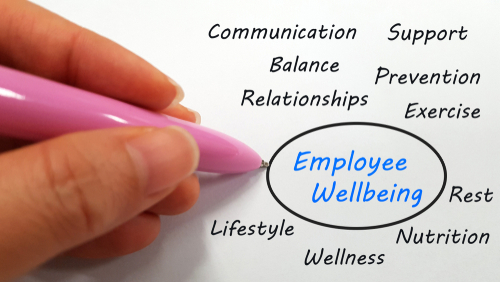A recent Gallup Survey of workers around the globe uncovered wide-spread low employee satisfaction and highlighted the need for a focused and intentional effort to support overall employee well-being. The survey showed 33% of workers across multiple fields considered themselves to be “thriving” in their workplace, with 19% reporting that they are “miserable.” Additionally, a staggering 60% reported themselves as “emotionally detached” at work. Focusing on well-being and belonging in the workplace is critical for companies to combat these negative feelings and ultimately avoid employee burnout and attrition. Well-being touches countless aspects of an organization, including engagement, retention, performance and even revenue. Although the individual is the “why” in the efforts, prioritizing effective well-being initiatives doesn’t just benefit individual employees- it benefits the entire company.
There is no “one size fits all” plan when it comes to creating a positive environment in the workplace. However, there are a few scalable items organizations should consider. This includes open communication, looking at wellness holistically and evaluating resources and benefits.
Open Communication
Creating an environment where people are safe to express their needs and concerns without fear of repercussions is essential. Companies, leaders and HR teams can establish forums for connection and communication, such as weekly one-on-one meetings, socializing in informal settings or small group meetings meant to drive collaboration and camaraderie. Creating an open line of communication between employers and employees is critical when focusing on workplace well-being. Creating a safe space for employees doesn’t require a licensed counselor and can be accomplished at any level.
A Holistic View of Well-Being
To effectively tackle wellness programs, companies must have a holistic view of well-being. This view considers the multidimensional aspects of wellness and looks at the whole person. At Paycom, we focus on prioritizing eight pillars of well-being, including physical, emotional, intellectual, spiritual, environmental, financial, occupational and social health. These pillars are interconnected and, in turn, have a significant impact on overall mental and emotional health in the workplace. Leaders can use these eight key areas as a framework to rethink employee health and well-being strategies and consider care for the entire employee.
For example, Paycom provides on-site well-being advisors who focus on proactive and prevention-oriented approaches to well-being. One way this proactive approach is enacted is by providing employees with resources, programs and education. Well-being advisors raise awareness of holistic initiatives through programs like a virtual or in-person “human hour” where employees find meaningful connection, or weekly scheduled virtual meditations for mindfulness and productive pausing. The key is to remove barriers and create well-being access for all employees.
Benefits and Programs
One of the most effective ways businesses can improve workplace well-being is to review their benefits and ensure they care for employees holistically. In addition to the on-site well-being advisors, Paycom offers strategically developed benefits because mental and emotional health is essential to who we are as a company and our values. A few examples of holistic benefits we offer include $0 co-pay for in-network therapy and counseling, online financial well-being resources, fitness facilities, privacy booths for virtual appointments and employee resource groups that provide space for employees to talk amongst their peers about commonalities, points of intersection and even engaging differences and allyship.
Actively monitoring what works and what doesn’t when it comes to creating and implementing employee wellness programs is one of the most impactful actions companies can take to ensure they are meeting their employees’ needs. Taking the holistic approach to wellness, fostering an environment that allows employees to feel comfortable communicating and strategically measuring the impact of programs and usage of benefits are critical in workplace well-being. Creating a culture where people feel supported does not always require a large budget. Companies that take the time and effort to intentionally invest in people will continue to receive a positive financial return by developing a program that works. The most important impact of this investment will be that people stay and thrive.
Tanner Bergman, manager of Well-Being at Paycom, is a licensed professional counselor (LPC) in Oklahoma and is board certified in the United States. A skilled leader, disruptor and clinician, he has a track record of building world-class mental health and well-being programs from the ground up. His professional experience spans emergency and behavioral medicine departments, nonprofits, community mental health, university settings, private practice and the tech sector.

